Beth Kephart's Blog, page 144
February 4, 2013
"You might as well be a mensch": Messages from My Father/Calvin Trillin
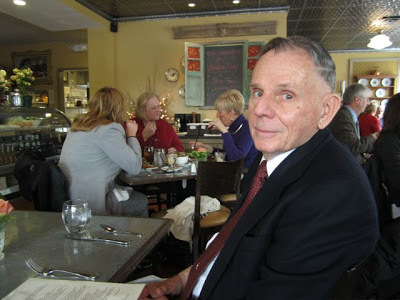
Yesterday was a celebration of my father on his birthday—a surprise cake among his many friends at his church, a lunch at his favorite, cafe, a somewhat disorderly assemblage of preferred foods from the Farmers' Market, organized into sub-specialty themes (here we have our cheeses and crackers, here our apple fritters, here our quiche, here our pecan pie), tickets to an upcoming high school production of Grease.
None of it being close to enough to honor the man who has always done so much for his wife (whose grave he still visits daily, even in blasts of winter cold), his three children and his three children's children. Kep Kephart has been a stealth benefactor, a man who has given without the slightest expectation a quid pro quo. Where there has been need, he has stepped in. Where there was college to pay for, he did. Where there were little TVs or kitchen pots that might have helped ease the lonesomeness of first studio apartments on Camac Street, say, little TVs and kitchen pots materialized. Where a trip away was precisely the cure for the tedium of too much stuck in a rut, a check arrived in the mail."Your father is a very good man," I was told, time and again, as I planned his surprise moment at the church. "We don't know what we'd do without him."
I was thinking about Kep Kephart, a Penn grad, devoted Presbyterian, retired businessman, and active consultant, while I was reading about Abe Trillin, the Jewish grocer of Kansas City, in Calvin Trillin's memoir Messages from My Father. Trillin's slender memoir never pronounces its guiding questions, its framing themes. Rather, it begins with a declaration—"The man was stubborn."—and proceeds to limn the life of a father who may not have made a strong first impression, with his "unprepossessing name," his "prominent nose," and his "negligible chin," but whose manners, values, and behaviors were of presidential caliber and consequence.
The contempt Abe feels "for people who felt the need to pump up their own importance" was encapsulated in a term; "that sort of person was "big k'nocker" (a phrase that would have fit nicely in with the recent New York Times story about parental boasting "A Truce in the Bragging Wars"). The fun he had with simple things—silly phrases, songs, marching tunes—seemed more important, looking back, than anything money might buy. His tenderness in letting an employee go, his admirable work ethic, his decision to be remembered, most of all, by his choice of yellow-tinted ties—all this gentleness, all this manliness, all this fatherliness. Calvin Trillin may have inherited his father's stubbornness, but he noticed, and absorbed, the bigger lessons his father taught.
Perhaps for Abe, and therefore Calvin, it all came down to a single phrase: "You might as well be a mensch." I hadn't seen the phrase before (the word, of course, but not the phrase), but I think I'd like to make use of it now—to seed my thoughts with its power. Here's Calvin in his trademark simply meaningful prose, parsing the line for the rest of us:
Even the words to live by that I have always associated most strongly with him—"You might as well be a mensch."—lack grandiosity. The German word Mensch, which means person or human being, can take on in Yiddish the meaning of a real human being—a person who always does the right thing in matters large or small, a person who would not only put himself at serious risk for a friend but also leave a borrowed apartment in better shape than he found it. My father clearly meant for me to be a mensch. It has always interested me, though, that he did not say, "You must always be a mensch," or "The honor of this family demands that you be a mensch" but "You might as well be a mensch," as if he had given some consideration to the alternatives.
I take mensch to mean a sweep of things, and also these essential things: Remember others. Acknowledge others. Be happy for what they achieve. Listen more than you talk, if you can. Don't make too much of your own glory.
For more thoughts on memoirs, memoir making, and prompt exercises, please visit my dedicated Handling the Truth page.




Published on February 04, 2013 06:13
February 3, 2013
Woolgathering/Patti Smith: Reflections
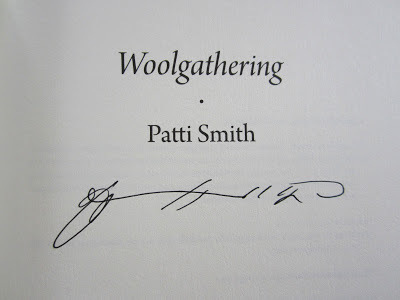
What are we to make of Woolgathering, this hand-sized book by the legend Patti Smith? First published in 1992 as a Hanuman Book and described by its author (years later, upon its re-release) as absolutely true. The book, legendary singer/writer tells us, was such that in its writing Smith was drawn from her "strange torpor." Here she is, looking back:
In 1991 I lived on the outskirts of Detroit with my husband and two children in an old stone house set by a canal that emptied into Lake Saint Clair. Ivy and morning glory climbed the deteriorating walls. A profusion of grapevines and wild roses draped the balcony, where doves nested in their tangles.... I truly loved my family and our home, yet that spring I experienced a terrible and inexpressible melancholy. I would sit for hours, when my chores were done and the children at school, beneath the willows, lost in thought. That was the atmosphere of my life as I began to compose Woolgathering.
There are photographs in this slight book—many of clouds, many of childhood places. There are concentrated memories, phantoms, distillations intensely personal and inescapably vivid. Some of the passages begin like the beginnings of psalms, or songs, while others break toward a private vocabulary.
Here is a line:
Exclamation! Questions of origin, scope.
Here is a scene, a codex, a rebus:
How happy we are as children. How the light is dimmed by the voice of reason. We wander through life—a setting without a stone. Until one day we take a turn and there it lies on the ground before us, a drop of faceted blood, more real than a ghost, glowing. If we stir it may disappear. If we fail to act nothing will be reclaimed. There is a way in this little riddle. To utter one's own prayer. In what manner it doesn't matter. For when it is over that person shall possess the only jewel worth keeping. The only grain worth giving away.
Woolgathering is a book of parts. It is a prayer set into motion. It is a return to child awe, a vindication of at least some part of adult responsibilities to make sense of things, to cohere. What do our minds do when we let them roam and wonder? Something perhaps, like this. Let Patti Smith lead the way.
Thanks to my friend Elizabeth Mosier, I will be seeing Patti Smith this coming Thursday evening at Bryn Mawr College. Elizabeth knows what a huge Patti Smith fan I am (I could not stop raving about Just Kids , for example (a book featured prominently in my forthcoming Handling the Truth), or about Smith's interview with Johnny Depp in the pages of Vanity Fair). She knows how proud I was of her piece about Smith in her alum magazine, here. And she knows that, even if I cannot find just the right cocktail dress to wear (because I end up looking so lousy in all of them), I will stand proudly at her side on Thursday, when the Main Line welcomes Patti to town.
For more thoughts on memoirs, memoir making, and prompt exercises, please visit my dedicated Handling the Truth page.




Published on February 03, 2013 08:15
February 2, 2013
Borrowed Finery/Paula Fox: Reflections

A dozen years ago, Paula Fox published Borrowed Finery, her memoir of a fractured childhood. She had reached her mid-seventies. She had long before attended Columbia, published adult novels deemed "brilliant" and "devastating," gained a reputation (and many awards) as a children's book author (Maurice's Room debuted in 1966; some twenty books for younger readers later, in 1999, she was publishing Amzat and His Brothers), and taught at the University of Pennsylvania, my own alma mater, though I, never believing myself worthy of a "real" writer's education, foolishly lost out on the opportunity to learn from her.
She wrote Borrowed Finery to tell the story of her young life.
It could not have been more lonesome, nor more confusing, the life that Paula led. She was the daughter of two self-consumed parents who left her to a series of caretakers while they tooled around the world or lost themselves to a miasma of their own making. Paula's happiest years were her earliest years, when she grew up in the gentle care of a pastor/local journalist who introduced her to books, encouraged her curiosity, and gave her a safe haven. She had continuity then, love—two things that would soon elude her as she was moved from the pastor's home to Hollywood to Long Island to Cuba to New York City to Florida to Montreal, among other places. Often she was left to her own devices. Sometimes her mother appeared and made demands, or her father reached out, then snapped. There were good uncles and bad uncles. There were friends who came and went, a stint among plantation workers, a teacher whose kindness mattered until it, like all else, vanished.
Borrowed Finery of is a memoir fashioned out of scenes and white space, painful particulars, gorgeous lines, stunning autobiographical cliffs and plummets. Sometimes all that is remembered is a story half-told. Sometimes it's a detail—flowers that smell of subway stations, a great grandfather who counts priests in Barcelona, the awareness (Annie Dillard like) of becoming aware. Sometimes there are long exercises in trying to remember, confessions of gaps, delays in understanding, whorled what-ifs. Maybe this. Maybe that. How could she know?
As her readers we admire her self-constraint, her implied theme making, her way of finding answers for herself—or, if not answers, a way of moving forward, and not back.
Paula Fox is brilliant. She writes of her early life with her minister benefactor like this:
I can still recall the startled pleasure I felt that Sunday in church when I realized his sermon was indeed about a waterfall. I grasped consciously for an instant what had been implicit in every aspect of daily life with Uncle Elwood—that everything counted and that a word spoken as meant contained a mysterious energy that could awaken thought and feeling in both speaker and listener.
For more thoughts on memoir making and prompt exercises, please visit my dedicated Handling the Truth page.




Published on February 02, 2013 08:15
my Chicago Tribune review of Reply to a Letter from Helga/Bergsveinn Birgisson

I had the great privilege of reading Reply to a Letter from Helga by the Icelandic novelist Bergsveinn Birgisson (translated by Philip Roughton) for the Chicago Tribune.
Yesterday the review appeared in the Tribune. I share fragments with you here, with the hope that you will seek out the book and read it for yourself. It moved me deeply.
From my review:
It is a story built of sheep horns, tussocks, gale winds, fishing huts,
bone button holders, wolffish skin lampshades, young puffins, half-dried
cod and one lovingly smoked corpse of a woman dead too long in a remote
stretch of frozen landscape. It is folk tale and philosophy, a farmer's
sensibilities and his favorite remembered poems. It is, most of all,
elemental.




Published on February 02, 2013 07:13
February 1, 2013
Introducing Cleaver: a new literary magazine
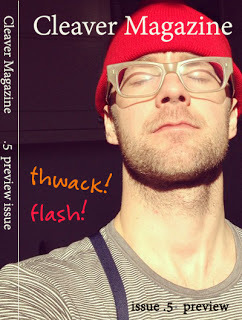
In short: Karen Rile amazes.
In long: Karen Rile is a creative force, a tireless teacher, a super-human funny one, a jaw-dropping mom, a friend. She paved the way for me as an adjunct at the University of Pennsylvania (Beth: Karen, where do you file the grades? Karen: I will call you and explain. Beth: What do you do with jubilant procrastinators? Karen: I will call you and explain. Beth: What do you do if your students don't all fit in your room? Karen: I will call you and explain.) She joins me in writing for the Philadelphia Inquirer (Karen's stuff goes viral while my stuff remains rooted in a petri dish). She had four children to my one and every single one of them is a star. She sends hysterical, private riffs regarding various Facebook commentaries that upend my dark moods of injustice. For that alone, she's priceless.
Karen Rile and me: we're friends.
When she told me that she and two of her daughters (Lauren and Pascale) were launching a new literary magazine (Cleaver: cutting-edge words), I had two thoughts:
* now Karen will never sleep, and
* this will be outstanding.
Friends, I was right. This inventive, thrilling, wow-whooping magazine has just been released in its .5 preview version and it crosses many spectra—art, poetry, fiction, essays, and the chop-chop stuff in between—while featuring my own other personal friends like Elizabeth Mosier, Lynn Levin, and Rachel Pastin. It's also beautifully designed. It's also technologically advanced. Choose your channel (HTML, Text, Mobile), sit back, and receive.
Also, judging from the fact that Karen is sending me emails at 3 AM and I am answering shortly thereafter, I was not exaggerating the no-sleep stuff.
I was lucky enough to be included in this first issue (click click). I like this, Karen wrote to me, when she received my piece. But, um, what is it, exactly?
I don't actually know. You'll have to judge for yourself. It starts like this, below, and it ends here.
I said it would be nice (look how simple I made it: nice) not to be
marooned in the blue-black of night with my thoughts, I said the
corrugated squares of the downstairs quilt accuse me, I said the sofa
pillows are gape-jawed, I said there are fine red hairs in the Pier 1
rug that will dislodge and drown in my lungs, I said I can’t breathe, I
said, Please.
Go chill with Cleaver.




Published on February 01, 2013 02:57
January 31, 2013
UNDERCOVER remembered in "Classics Outside of the Classroom" story in VOYA
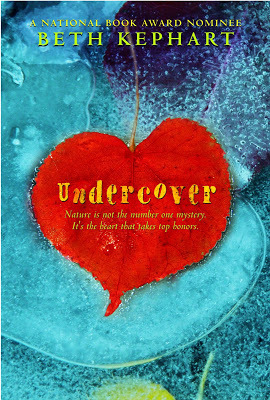
I began blogging some nine books ago, right around the release date of Undercover. This was my most autobiographical young adult story, a tale vaguely based on my own days as a striving high school poet with a love for ice, float, and speed, and with an English teacher who took note of all I was afraid to be.
Today my friend Ed Goldberg (of the blog Two Heads Together, among other things) sent word that Undercover has been remembered by Jennifer Miskec and Katy J. Stein in a February 2013 VOYA article called "Classics Outside of the Classroom."
From the article:
Over the last decade, young adult literature has seen a minor boom in the publication of adaptations of classic literature. What can be an English teacher's best friends, books like Sharon Draper's version of Romeo and Juliet (Romiette and Julio) makes Verona a little more imaginable; Beth Kephart's Undercover, Cyrano d'Bergerac recast with fifteen-year-old Elisa, makes Cyrano just like one of us. These adaptations can be a useful bridge between the teen reader's own life and the privileged space of classic literature, because authors modernize—and sometimes even sanitize—the famous stories, making them both familiar and educational for a new audience.
The piece goes on to describe a number of YA literary adaptations, including a beautiful long paragraph dedicated to Undercover.
I am indebted to the authors. I am indebted, as well, to Ed. I had always hoped that classroom teachers would discover Undercover and make it part of a broader curricula.
Thank you.




Published on January 31, 2013 15:42
Hairography: a memoir lesson

Years ago, I wrote a book in the voice of a river—Flow: The Life and Times of Philadelphia's Schuylkill River—and felt it to be my truest book—my least defended, my most vulnerable. I was speaking in the voice of another, and so I was speaking with undiluted honesty about how I lived lonesomeness, forsakenness, slow faith, trust, and love.
Ever since Flow, I have encouraged my students to write in the voice of another so that they might better see themselves. Autobiographies of the inanimate have ensued. Autobiographies of the comb, the toothbrush, the flashlight. Autobiographies of the ID card, the pink sweater, the dandelion-tattooed iPhone case, the glass horse, the pipe, the yellow post-it (one year old). While in Miami with the two dozen YoungArts writers, we talked hairography—the pieces I'd asked them to write in the voice of their hair. We reviewed questions of gender, tense, knowledge, research. We talked, specifically, about empathy—about how, forced to see one's own self through the eyes of a constant, silent witness, we grow. Our language changes. Our understanding steeps.
And so: Choose an object or a thing that is always nearby. Imagine yourself into its perspective. See what it teaches you.
Here, for example, is my own hairography. It is speaking to the twenty-four. It is speaking to you.
Hairography
Language like fumes. Language particulate and strange—the
caper of a thought, cleaved. Here
are some words:
Efflorescence. Interjacent.
Lagniappe. Rune. Here is the vast task of my existence: to listen. I am electrostatic frizz, I am frump, I am
inconvenient. I am fallen,
twisted, clawed, resisted, shamed.
There are one hundred thousand of me. But in the spaces in between, I breathe.
What
I’ve learned (we):
Language
is larger than words. Language is
song and pace, hurry and pause; take it one shivering um at a time. Language wants to participate and it is
afraid and it waits for a sign.
Language bends, and any sentence studied might be a poem. Make the poem. Defy the easy tease of
ordinary-ness. Live language
large. Look at me hanging here,
desperate here, curling. Appease
me.
You
will have noticed some things: In
the making of the new there will be consequences. In the struggle to know there will be pain. In the urge to emerge there will be
casual disregard. In the arsenal
of punctuation, on the snowbanked page, in the sudden silence, answers will be
found. Against chemistry,
machines, mongers, fads, grandiose insensitivities, and regrettable excess wage
war.
Corrugated,
coruscated, unfit: Your eyes,
through the years, have accused me.
Brittle, broken, lied to, lied for, left to wind and winter, smoke and
cure, delusion, bedsheets: I yet
remain. (We.) I grow old. I wait.
Language
like fumes—did you hear me?
Language particulate and strange.
If my gift is how I listen, your gift must be how you talk into the
page. How you tunnel
through—cuticle to follicle to brain blood heart. How you—somehow—remain.
What
did you say?
For more thoughts on memoir making and prompt exercises, please visit my dedicated Handling the Truth page.




Published on January 31, 2013 05:55
January 30, 2013
Handling the Truth: notes on the launch journey
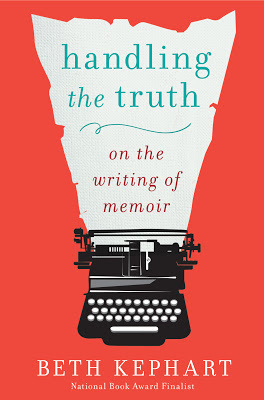
Later this year, on August 6th, Handling the Truth, my book about the making of memoir, the students I've taught, the many memoirs I've read, and the lessons I've learned, will be released by Gotham.
I'll be celebrating its release on launch day at the main branch of the Free Library of Philadelphia, where I will be offering not just a reading but a workshop opportunity.
Between now and then I'll be blogging about the new exercises I'm giving to my current University of Pennsylvania memoir class, the new/old memoirs I'm reading, and the debate that continues to swirl around this form. I'll notch these new exercises, reviews, and commentary onto the dedicated Handling page after they appear here, so that that page will then serve as a supplemental repository.
Because no book about writing, especially, is ever really done.




Published on January 30, 2013 06:58
January 29, 2013
what do you desire?
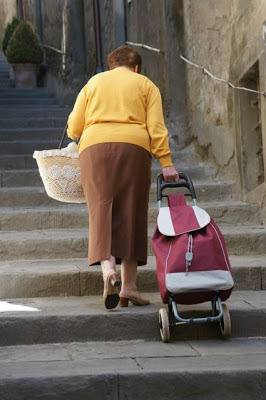
I stopped at The Strand while making my way to a client the other day. It was a long walk and bitter cold. I wanted warmth. I needed books.
Patti Smith's Woolgathering was on a front table, signed. It was mine in an instant, and today, while on the train to Penn, I read. Patti gave the class its first exercise of the day, which began with her words below:
Blowing upon it, candles, a star ... What does one desire. A partner. A freewheeling moon. Or perhaps to hear again as one heard as a child. A music—curious, optimistic, as plain and elusive as the call of the reel permeating a summer night. Expanding squares of laughter and delight. Everyone dancing, just dancing.
In three to four sentences only, write what you desire, I said.
Oh, how they broke my heart. Oh, how I wanted to be their age again. So many years of doing still laid out before them.
I have a wonderful class.




Published on January 29, 2013 17:38
Her Familiars/Jane Satterfield: Reflections

It has become my habit to wake at 1:47 most nights, two hours of sleeping in. I make my decision—to wait in the upstairs dark, to wait in the downstairs dark, or to somehow make use of the time.
For many weeks now (I am not counting, I am afraid), I have made use of the time—doing the work set down before me, leaving all the stacks of books that aren't required reading somewhere to the side, for an intangible, mythical then.
Today when I woke I realized that I had a very small pocket of time that was indeed my own. And so I came downstairs, turned on the light, and opened a book that had been sent to me weeks ago by my long-time friend Jane Satterfield. Jane and I met at Bread Loaf years ago and never lost touch, though sometimes too much time goes by without a correspondence. I saw Jane most recently during the Bruce Springsteen Glory Days symposium at Monmouth University. We hardly had the time to speak as we like to speak. It was a public forum.
In any case, Jane's book, Her Familiars, is a third collection of Satterfield poems, and there was no way I was going to rush through it. Jane has a habit of filling her poems with entire worlds, of researching an idea, committing history to the page, surprising the reader with allusion and symbol. She writes magnificently, and without shortcuts. I wanted to take her poems slow. I did.
Thankfully, for those who aren't nearly as well-read as Jane, Jane includes, in Her Familiars, some end notes to help contextualize her work. And so, poem by poem, I read, thinking—This is the one I will share on my blog! Or, This is the one I will read to my students! Flipping back to the note pages, always, to be sure I received the full intent of the poem.
And then I got to the title poem, "Her Familiars," which begins like this:
Just past her birthday (thirteenth)
my daugther's engrossed
in the antics of the Pretty Committee
who, swish bags in tow,
shop for amazing LBDs....
and then sweeps into its larger meditation on beauty, age, oddness, the recharge of time—coiling higher and higher, in trademark Jane style, thrillingly, to this mid-point passage:
... Just look at
the woodcut, frontispiece to
The Discovery of Witches,
London, circa 1647, where one-legged
Elizabeth Clarke, whose
mother (maybe witchy
with words or wise with a cure?),
a heretic, hung before her.....
And, toward the end, leaves us with this line:
.... The feeble, the poor, &
otherwise popular didn't
stand a chance.....
I knew, reading, that I loved this poem. But I also knew that I didn't fully understand it, that I had not fully penetrated its many reverbing layers, its codices, its effects and affects, so I went to the notes and found this:
Nigel Cawthorne's Witch Hunt: History of a Persecution (London: Arcturus, 2003) provided useful background; the "Pretty Committee" appears in the YA Series, The Clique. This poem is for Beth Kephart.
I could read no further. I had to stop. Had to thank Jane Satterfield right then, right now—for being my friend, for putting up with my ridiculous schedule, for writing so magnificently, always. For remembering me and for bringing me solace, in the midst of another dark night.
You are the true and brilliant poet, Jane.




Published on January 29, 2013 06:14



